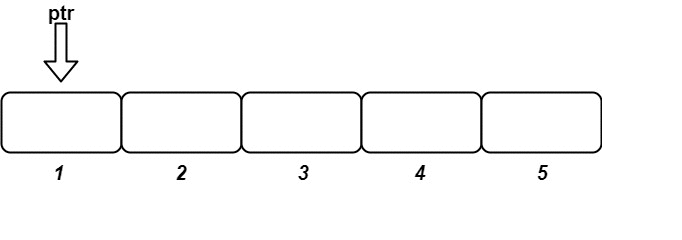1656. Design an Ordered Stream
Description
There is a stream of n (idKey, value) pairs arriving in an arbitrary order, where idKey is an integer between 1 and n and value is a string. No two pairs have the same id.
Design a stream that returns the values in increasing order of their IDs by returning a chunk (list) of values after each insertion. The concatenation of all the chunks should result in a list of the sorted values.
Implement the OrderedStream class:
OrderedStream(int n)Constructs the stream to takenvalues.String[] insert(int idKey, String value)Inserts the pair(idKey, value)into the stream, then returns the largest possible chunk of currently inserted values that appear next in the order.
Example:

Input ["OrderedStream", "insert", "insert", "insert", "insert", "insert"] [[5], [3, "ccccc"], [1, "aaaaa"], [2, "bbbbb"], [5, "eeeee"], [4, "ddddd"]] Output [null, [], ["aaaaa"], ["bbbbb", "ccccc"], [], ["ddddd", "eeeee"]] Explanation // Note that the values ordered by ID is ["aaaaa", "bbbbb", "ccccc", "ddddd", "eeeee"]. OrderedStream os = new OrderedStream(5); os.insert(3, "ccccc"); // Inserts (3, "ccccc"), returns []. os.insert(1, "aaaaa"); // Inserts (1, "aaaaa"), returns ["aaaaa"]. os.insert(2, "bbbbb"); // Inserts (2, "bbbbb"), returns ["bbbbb", "ccccc"]. os.insert(5, "eeeee"); // Inserts (5, "eeeee"), returns []. os.insert(4, "ddddd"); // Inserts (4, "ddddd"), returns ["ddddd", "eeeee"]. // Concatentating all the chunks returned: // [] + ["aaaaa"] + ["bbbbb", "ccccc"] + [] + ["ddddd", "eeeee"] = ["aaaaa", "bbbbb", "ccccc", "ddddd", "eeeee"] // The resulting order is the same as the order above.
Constraints:
1 <= n <= 10001 <= id <= nvalue.length == 5valueconsists only of lowercase letters.- Each call to
insertwill have a uniqueid. - Exactly
ncalls will be made toinsert.
Solutions
Solution 1: Array Simulation
We can use an array $\textit{data}$ of length $n + 1$ to simulate this stream, where $\textit{data}[i]$ represents the value of $\textit{id} = i$. At the same time, we use a pointer $\textit{ptr}$ to represent the current position. Initially, $\textit{ptr} = 1$.
When inserting a new $(\textit{idKey}, \textit{value})$ pair, we update $\textit{data}[\textit{idKey}]$ to $\textit{value}$. Then, starting from $\textit{ptr}$, we sequentially add $\textit{data}[\textit{ptr}]$ to the answer until $\textit{data}[\textit{ptr}]$ is empty.
The time complexity is $O(n)$, and the space complexity is $O(n)$. Where $n$ is the length of the data stream.
Python3
class OrderedStream:
def __init__(self, n: int):
self.ptr = 1
self.data = [None] * (n + 1)
def insert(self, idKey: int, value: str) -> List[str]:
self.data[idKey] = value
ans = []
while self.ptr < len(self.data) and self.data[self.ptr]:
ans.append(self.data[self.ptr])
self.ptr += 1
return ans
# Your OrderedStream object will be instantiated and called as such:
# obj = OrderedStream(n)
# param_1 = obj.insert(idKey,value)
Java
class OrderedStream {
private int ptr = 1;
private String[] data;
public OrderedStream(int n) {
data = new String[n + 1];
}
public List<String> insert(int idKey, String value) {
data[idKey] = value;
List<String> ans = new ArrayList<>();
while (ptr < data.length && data[ptr] != null) {
ans.add(data[ptr++]);
}
return ans;
}
}
/**
* Your OrderedStream object will be instantiated and called as such:
* OrderedStream obj = new OrderedStream(n);
* List<String> param_1 = obj.insert(idKey,value);
*/
C++
class OrderedStream {
public:
OrderedStream(int n) {
ptr = 1;
data = vector<string>(n + 1);
}
vector<string> insert(int idKey, string value) {
data[idKey] = value;
vector<string> ans;
while (ptr < data.size() && !data[ptr].empty()) {
ans.push_back(data[ptr++]);
}
return ans;
}
private:
int ptr;
vector<string> data;
};
/**
* Your OrderedStream object will be instantiated and called as such:
* OrderedStream* obj = new OrderedStream(n);
* vector<string> param_1 = obj->insert(idKey,value);
*/
Go
type OrderedStream struct {
ptr int
data []string
}
func Constructor(n int) OrderedStream {
return OrderedStream{
ptr: 1,
data: make([]string, n+1),
}
}
func (this *OrderedStream) Insert(idKey int, value string) []string {
this.data[idKey] = value
var ans []string
for this.ptr < len(this.data) && this.data[this.ptr] != "" {
ans = append(ans, this.data[this.ptr])
this.ptr++
}
return ans
}
/**
* Your OrderedStream object will be instantiated and called as such:
* obj := Constructor(n);
* param_1 := obj.Insert(idKey,value);
*/
TypeScript
class OrderedStream {
private ptr: number;
private data: string[];
constructor(n: number) {
this.ptr = 1;
this.data = Array(n + 1);
}
insert(idKey: number, value: string): string[] {
this.data[idKey] = value;
const ans: string[] = [];
while (this.data[this.ptr]) {
ans.push(this.data[this.ptr++]);
}
return ans;
}
}
/**
* Your OrderedStream object will be instantiated and called as such:
* var obj = new OrderedStream(n)
* var param_1 = obj.insert(idKey,value)
*/
Rust
struct OrderedStream {
ptr: usize,
data: Vec<Option<String>>,
}
impl OrderedStream {
fn new(n: i32) -> Self {
OrderedStream {
ptr: 1,
data: vec![None; (n + 1) as usize],
}
}
fn insert(&mut self, id_key: i32, value: String) -> Vec<String> {
self.data[id_key as usize] = Some(value);
let mut ans = Vec::new();
while self.ptr < self.data.len() && self.data[self.ptr].is_some() {
ans.push(self.data[self.ptr].take().unwrap());
self.ptr += 1;
}
ans
}
}